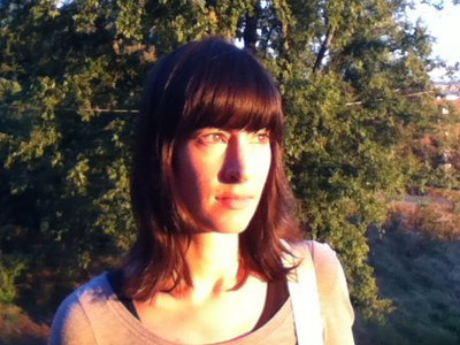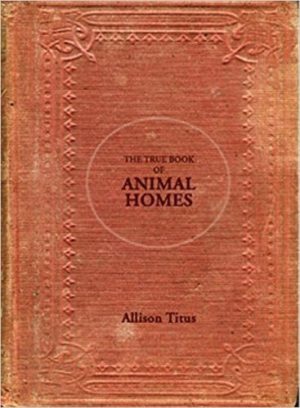In Their Own Words
Allison Titus on “Oh Little Fox”

Oh Little Fox
Could wildly;
could wilder.
Little radar in the burrow
and the underbrush and the
empty rabbit tunnel. Little
concierge in the blackberries,
in the new south,
behind the field
house,
in the brambles. Little ache
in the inventory
folding the forest
in half.
From The True Book of Animal Homes (Saturnalia Books, 2017). All rights reserved. Reprinted with the permission of the author.
On "Oh Little Fox"
"Oh Little Fox" is an asterisk to the book it appears in, which mostly divides poems into Office or Essay poems. It has the same concerns, centered on the animal body, but it's a tiny lyric gesture in a field that exists formally outside of this "office" architecture: by which I was thinking about the stations human and non-human animals hold, how we come to occupy a particular space/what keeps us there.
1) This poem was written for and to the foxes.
2) In the 1950s, a Russian geneticist started an experiment to domesticate foxes. His name was Dmitry Belyaev. The study is still ongoing, now led by Lyudmila Trut, who took over after Belyaev's death. The Silver Fox Experiment: to create a fox who inherited tameness over the span of one human lifetime, and could demonstrate inborn attentiveness to human command and the propensity to subvert their natural instincts as dogs have been domesticated to do (to sit, stay, instead of darting off the first instant the leash goes slack). After breeding so many generations of farm foxes, the study still hasn't proven that the tame foxes pass this tameness on to their offspring, because it ran out of money and remains, for now, on hold. This means that hundreds of foxes, desperate for human attention and social interaction, languish in 3-foot wire cages, calling into the concrete-colored Siberian afternoon. I was thinking about those foxes, brought so close to the brink of being tame, taught to surrender to the desire to be held—just to be (ever) held apart. (And also, what's worse: a tame animal in a cage, coerced to crave attention that's withheld, or a wild animal in a cage, withheld from its wilderness? I don't know.) You can buy one of these tame Siberian foxes and have it shipped to your door for $7,000.00.
3) Back in 2013, in my home state of Virginia, there was legislation before the General Assembly attempting to outlaw fox-penning, which—why would you ever have heard of it— is a "sport" where wild foxes, caught by trappers, are placed inside wooded enclosures, of maybe 100 acres, into which hundreds of hunters then release their hounds. The point is for the hounds to chase to exhaustion the stressed-out foxes who have nowhere to hide, save for a "hiding structure" (picture an overturned barrel) per every 20 acres. Hired judges stand around and record the progress, scents tracked or lost. Points are awarded, wads of money handed over. Now and then a fox is killed or a dog is wounded. Supporters of these competitions claim they're valuable for training dogs to hunt, that they keep The Hunting Tradition alive. But hunting's tradition is not about the pursuit of trapped animals: it's the opposite. For the record, I'm not pro-hunting. But I'm especially not pro-fake-hunting, good grief: The pantomime of it, the celebration of a pseudo-chase, the monetization of the enactment of wilderness up-close. Anyways, this is all to say that I spent some time back then lobbying at the General Assembly, wandering down the fluorescent halls and knocking on office doors, trying to get the lawmakers to care about the foxes. But they were always in meetings. Maybe this will sound silly, this attempt to ban fox-penning in a world like we currently live in which feels so fraught/a little post-apocalyptic lately, but (here is my agenda) the oppression of non-human animals and the oppression of human animals is absolutely connected. All forms of oppression, all systemic and structural violences, render us all diminished. But even though I was trying to do something meaningful, it felt like the action was getting away from the actual point, which is: the wild fox belongs to its wildness "in the new south/behind the field house/in the brambles" etc.
4) How could I return the fox to its feral self? How could I rewild it.
5) I wanted to write a poem that placed the fox back inside the forest, that stripped away everything but the animal and its body and its body's place in the natural world. I didn't want to use the fox as a placeholder, the idea of the thing instead of the thing itself; I didn't want the metaphorical fox. I wanted to try to write something that distilled the fox to its strange fox essence, minus agenda. It's a poem with simple desires: for the body to remain intact; to depict the shape the body makes against the backdrop of the world.
6) Also, this poem for a brief time became a love poem.
7) There is a quote on a scrap of paper that hangs above my desk at work which reminds me every day, again, how to live: "The animal's face leans toward me. I am filled with tenderness for it. Its tongue touches the surface of me, lapping a little. It takes part of me into itself." [::David Malouf, An Imaginary Life.]



